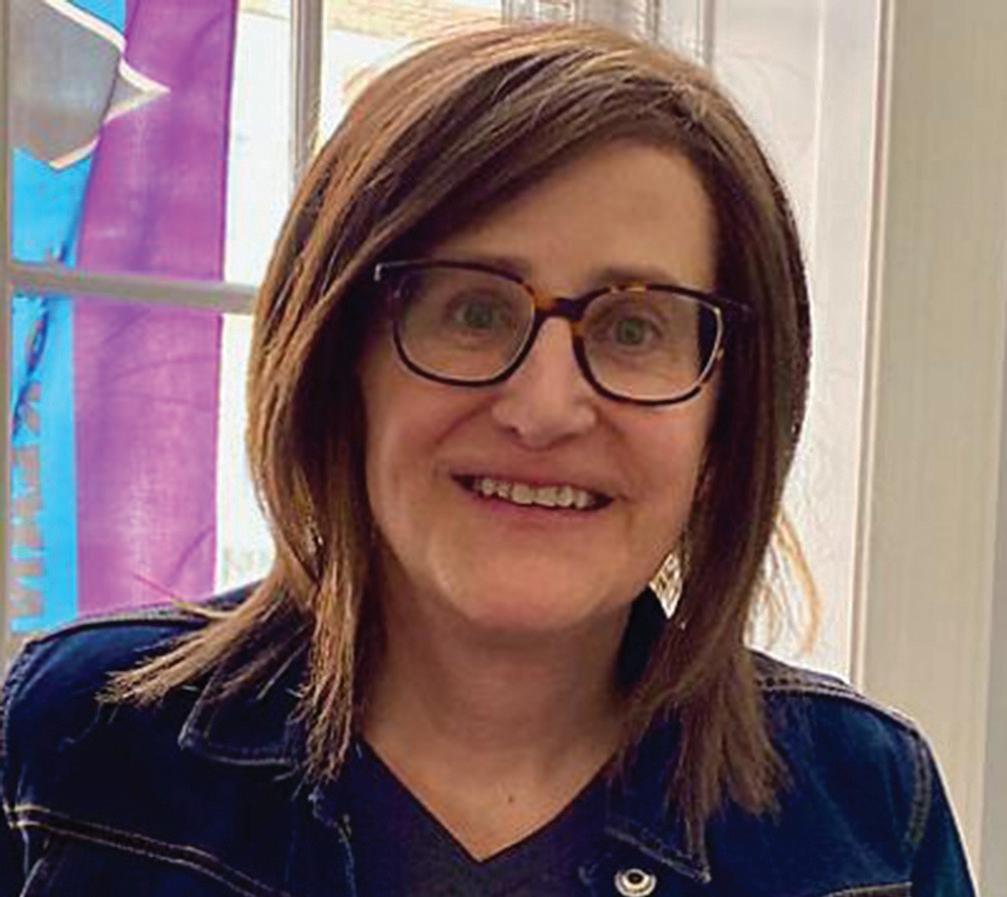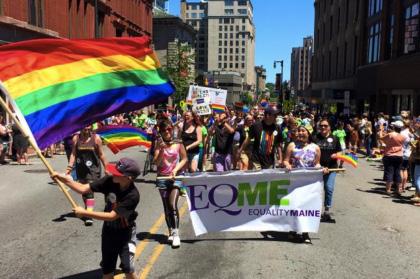
4 minute read
Community Connections: EqualityMaine
Edited for Length and Clarity by Audrey Erickson
We [also] invest time and energy around advocating for laws and policies that protect our community, at the local, state, and federal level. As the director, I get to sort of make sure all that happens, which is exciting. I got involved in this work 12 years ago or so. I lost my job when I transitioned, and found a great community here in Maine and in Portland. I started volunteering with a couple of different LGBTQ organizations, and one of them was EqualityMaine, on the marriage campaign of 2012. And from there, I went from volunteer to Executive Director.
AE: What is EqualityMaine working on right now?
Directing and Dramaturgy Apprentice Audrey Erickson sat down with Executive Director of EqualityMaine, Gia Drew, to discuss EqualityMaine's work supporting the LGBTQ+ community in Portland and across the state.
Audrey Erickson (AE): Thank you so much for sitting down with me today, Gia. Can you tell our PlayNotes readers a bit about yourself?
Gia Drew (GD): I'm Gia Drew, and I'm the Executive Director at EqualityMaine. My pronouns are she and hers. I've been with EqualityMaine for ten years, and I've been the Executive Director now for about nine months.
AE: Can you tell us about EqualityMaine’s mission, and how you got involved?
GD: EqualityMaine [has] been advocating on behalf of Maine's LGBTQ+ community for 39 years. Our work usually involves three different areas. We provide a lot of education around what it means to be LGBTQ... We do a lot of community-building to make sure folks who are connected to our community feel connected to one another, across this beautiful, large, rural state.
GD: There's a lot of stuff happening really locally… school board fights, trying to ban books or drag queens at schools. We're trying our best to support local communities and those efforts. [We] develop some messaging and some toolkits around how folks can get involved and what they can do to support their local LGBTQ kids. At the state level, unfortunately, there are 40+ anti-LGBTQ bills that have been introduced. Nothing like this has ever happened in the history of Maine. There are 450 bills across the country. But we also have a positive agenda, we're trying to get 12 pro-LGBTQ [bills] passed as well.
AE: Can you tell us what some of those bills are, and what issues we should be paying attention to?
GD: Like most of the bills across the country, most of the anti-LGBTQ bills have to do with public schools. The majority of those [bills] have to do with, quote, unquote, "parental bill of rights." I say "quote, unquote" because it has nothing to do with parents' rights, it just has to do with disrupting public education. [We want to shape] what curriculum looks like, to make sure curriculum is inclusive and diverse and represents the diverse humanity we live amongst, across this globe and here in Maine.
There's some bills around trans rights in schools, making sure that kids get to use names and pronouns that they like best. For the second time, there's a bill that would ban transgender girls from participating in sports from as young as kindergarten, all the way through college… [With] our positive bills, some have to do with cleaning up state government to make sure that all their vital records and forms have spaces for "M [male]," "F [female]," and "X [unspecified or another gender identity]." We'll try to make sure that gender-affirming care is covered by MaineCare which it already is, but it's not in law, so we're making sure that's been put into law, so it can't be repealed quickly, like it's being done across the country. And we're even trying to allow minors access to hormone therapy, if their parents are not supportive, or they don't have a parent or guardian to access that medical care.
access points for people to sort of engage with complex ideas. I think there's a really important role for the arts, in theater, in a play, in fleshing out those things that happened in politics.
AE: Do you see any overlap with your creative arts background and the work you do now?
GD: I think a lot of people are like, "What's creativity have to do with politics and policy?" For me, having that background and being a creative thinker, I tend to come up with ideas and conversations that haven't been thought about before… [I bring] people together you wouldn't normally bring together, or in a conversation, rather than the usual suspects, maybe there's some other people that need to be at that table to flesh out those ideas.
AE: How can interested people get involved in supporting the work EqualityMaine does?
AE: How do you think storytelling or pieces of art influence political activism, or impact human rights work and social justice issues?
GD: I think the arts have always been deeply connected to politics and protest and to advocating for human rights. I think that they're intricately connected. [Policy] wasn't my field I was a high school art teacher for 20 years. When you hear a case like Doe v. Clenchy, which was a really important case here in Maine history that had to do with transgender rights… you wouldn't know it's the most important case for a transgender student's rights in US history. But it was actually heard here in the state of Maine. Some people may dismiss it, because it has to do with the law, or it has to do with public policy. The idea of humanizing some really complex things can create different
GD: Great question. Just last week, we had our annual awards and auction. We raise awareness about the work we're doing, and during that event, we talked about the way people can get involved. And it's not just money yes, money does help, we're a small nonprofit with a staff of four but there's other ways folks can get involved as well. We do need volunteers, there are many events to help us staff. Sometimes we need help with the legislature. If you have a story that you'd like to share, there's an opportunity to. If you want to talk to your legislator about an issue that you're passionate about, there's always the opportunity to do that as well. We are a resource, but we're also a conduit to other resources… There are a myriad of things that could be happening and [people] reach out to us because we are relatively well known, [and we've been] around for a long time. We can point them to an agency that is LGBTQ inclusive, or can direct them to file a complaint, or connect them to a lawyer. [People can] connect with us through our website, there are some good resources and information about organizations. Our social media are current as well, so those are ways folks can get connected to EqualityMaine.
Keep up with EqualityMaine online at www.equalitymaine.org, or on Instagram @equalitymaine!











